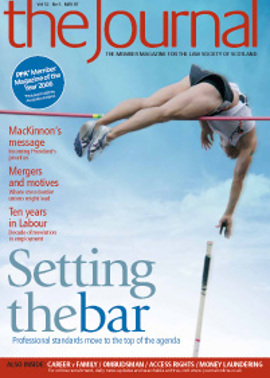Two into one can go

“A merger to create a legal powerhouse”; “realising the opportunities that a deregulated market will offer”. With such phrases the merger between Glasgow-based Golds and English regional giant Irwin Mitchell was blazed to the world on 12 March. But does it mark the beginning of a new era in the ownership of the legal profession, or is it just the latest step in the growing level of cross-border capability as firms compete for the big corporate clients?
The press releases from Irwin Mitchell, as the merged firm is to be known, played up the firm’s strategy, “as the UK’s largest and most diverse supplier of commoditised legal services”, of positioning itself to be able to respond to the opportunities for investment presented by the Legal Services Bill for England & Wales, currently under scrutiny in the Lords. However Mark Higgins, one of two Golds partners given a senior role in Irwin Mitchell under the merger, plays down this angle for the time being.
“It wasn’t the main motive”, he asserts. “The structure and timing of the bill is still in the air.” As indeed it is, with the government having recently admitted that implementation will not take place before 2010, and probably not till the following year. In fact some in Scotland who wish to see an equality of opportunity here, have suggested that this provides a window to get ahead of the game – one of many matters waiting in the in-tray of the new Scottish Executive.
Increased capability
Higgins does not deny his firm’s interest in the subject, but maintains that business growth drivers were principally behind the merger, with the small size of partnership in Golds looking for ways of bringing in capital to fund further expansion. “We had reached a natural break in the history of Golds. The main reason for choosing to merge was that it gave us access to a scale and to resources across the UK to grow the business. Already since the merger was announced, new opportunities have come up that we wouldn’t have been able to take advantage of before.”
To some people Golds remained a “conveyancing factory”, an image Craig Marshall, now regional managing partner of Irwin Mitchell in Scotland, is very keen to shake off. “We moved on from that some years ago – 90% of our work now comes from institutions or referrals from large organisations.”
There is undoubtedly a trend towards achieving a cross-border capability in order to serve the blue chip corporate client, whether on your own – if the size of your firm will support such a venture – or via a merger. Malcolm McPherson, senior partner of HBJ Gateley Wareing, a firm born last year from another cross-border marriage, says the combined firm has delivered results. “It’s worked very well and we’ve had a number of pieces of work and got on to a number of panels where independently we wouldn’t have got the opportunity. And where work was coming to us for Scotland only in the past, it now comes for the whole of the UK and we can choose where best to resource it.” With increased scale between their Edinburgh and Birmingham offices providing the human resource, and the financial wherewithal, to invest in projects which HBJ could not have tackled on its own, “It just allows us to be more ambitious.”
Freedom to act
McPherson for one is not reticent about the likely impact of the English bill. Having long argued that legal practices need to be able to raise equity from beyond the partner pot, he is “100% in favour of the business opportunity” the bill represents. Would it provide an added impetus to further cross-border mergers? “I don’t think it will just be an impetus; it will be a decisive factor. There’s no question that opportunities lie in the English jurisdiction that don’t lie in the Scottish one.” He predicts also that if the bill goes through without Scotland doing something similar, Scottish firms that can do so will organise themselves so as to become English regulated.
“I do think that will happen. And I have in discussions with others, in firms of equivalent size to ours, heard that that is something that people are considering, are reflecting upon now. You cannot be put in a position where your business may be prejudiced going forward by the legislation or the regulation in your jurisdiction when you have the clear opportunity to move elsewhere and free yourself up to make the best business decision for yourself.”
International forces
The Golds/Irwin Mitchell news made some waves, but there are those already in Scotland as part of a much bigger international presence. One of the first was CMS Cameron McKenna, whose five UK offices, including Aberdeen and Edinburgh, are part of a fully integrated practice covering 10 countries, many in eastern Europe, and a wider “CMS alliance” with a presence in a further 16. Stephen Millar, an energy partner in the Aberdeen office, comments that while the firm has “probably kept a relatively low profile for a number of years as a result of being a London headquartered firm”, it is proud of its cross-border tradition and there is “probably less of a taboo now” to having its head office in the City.
As another indicator of market drivers at work, this time to Scotland’s benefit, due to Aberdeen’s status within the oil sector the CMS office there is a hub in its own right, as much of the work carried out serves operations in western Europe, Russia or west Africa. Millar regards the merger trend as inevitable, “and probably good news for a lot of clients and a lot of firms. It’s quite nice to say that we’ve been doing it for a long time. It’s certainly what the clients like, being close to them and having big capability”.
Market-led consolidation, he points out, is taking place at local as well as national level. “I think the whole legal profession is becoming a much more structured business sector where the drivers of overhead and consistency and greater coverage are becoming greater and greater factors to be taken into account.” And even if change can be “scary” at the time, “I think one thing I’ve learned living in Aberdeen, is that generally change comes along, quite often things are uncertain at times, but in the end of the day there will be a lot of good comes out of it.”
Finding the right merger partner can be a matter of moving in the right business circles. HBJ and Gateley Wareing were introduced by a corporate banker who had worked with both firms and recognised a potential cultural fit. Golds and Irwin Mitchell began collaborating when on the panel of an insurer client and discovered a shared approach to business, including their commitment to commoditisation – the volume processing of particular types of legal work – in which each firm had a name in separate but complementary fields.
Whatever the catalyst, the common interest for Scottish firms is a share of the big money increasingly to be made in the English market as compared with the Scottish. Malcolm McPherson reports that “Several partners in the biggest Scottish firms have said to me that their growth in London is far outpacing Scotland, and that’s good.” More often than not now, these firms have a presence in London, and for mid-ranking firms with ambitions to join them, merger is an obvious strategy. Indeed opportunities could lie further afield. Irwin Mitchell, for instance, which currently has two Spanish offices, has one debt management client with operations in 20 countries. As Mark Higgins comments, “Before Irwin Mitchell, Golds could not realistically have dealt with work outside the UK. Now, as Irwin Mitchell, we can.”
In short, one way or another the English market is set to exert a strong gravitational pull on Scottish legal firms, and whether or not they actively plan to open their equity to outside investors, they will increasingly find themselves in a position to do so as and when the legal position in England permits. Scottish legislators, policymakers and stakeholders alike will come under increasing pressure in the new parliamentary session to come up with a clear strategy in response.
SOCIETY BACKS THE MOVE SOUTH
The Law Society of Scotland, which is closely following the Legal Services Bill, continues to maintain its stance that a proper model for external ownership has yet to be devised. “In its current form the English bill is unbelievably complicated in its language, but lacks real substance as to when an external party should be regarded as someone fit to own a share in a law firm”, comments Bruce Ritchie, Director of Professional Practice at the Society.
But that does not prevent the Society from encouraging expansion south of the border by Scottish firms.
“The Society regards mergers such as Golds/Irwin Mitchell as a positive development”, says Ritchie. “It sees itself as facilitator as much as regulator in order to allow Scottish solicitors access to the much greater legal services market in England.” The Society, he explains, is “entirely comfortable” with the new firm being English based. PII cover will be arranged under the English regime, which means no added risk for the Scottish Master Policy – a good thing because the new firm (which claims to be fourth largest in the UK by number of fee earners) weighs in at much larger than any in Scotland at present.
The merged firm, Ritchie adds, “represents the first true multi-national practice [MNP] created from a merger between firms in Scotland and England”, i.e. a single firm rather than two firms operating under an umbrella LLP – the current structure at HBJ Gateley Wareing, for example. Nor does the Society stand to lose financially: apart from the Master Policy and Guarantee Fund, it regulates individuals and not firms, and individual Scottish solicitors continue to take out Scottish practising certificates. (With the Guarantee Fund there is a reciprocal arrangement under which the Society continues to inspect the Scottish offices of English-registered firms; any dishonesty by a Scottish solicitor in such an office would come under the Scottish Fund.) The Society actually benefits to the extent that currently, under the Solicitors (Scotland) Act, MNP partners who are not Scottish solicitors have to be registered foreign lawyers in Scotland, paying an annual fee, and the firm faces a one-off application for MNP registration. Scottish partners in English firms, by contrast, are viewed as “unregistered European lawyers” unless based in England, as the rules there currently stand.
If a Scottish firm were to switch to being regulated by English rules they could not describe themselves as “solicitors” in Scotland, nor could they carry out work in the three reserved areas, even if the individual solicitors continue to hold Scottish practising certificates.
In this issue
- Block fees: the story behind the changes
- Strategic advance
- Court plans with little appeal
- Under commission
- Two into one can go
- Ten years of labour
- Career v Family
- Monitor - at your own risk
- Raising the standard
- Society shapes the changes
- Society shapes the changes (1)
- Money laundering to change again
- Border and Immigration Agency launches
- Dealing positively with client concerns
- From the Brussels office
- Winning ways
- Toothless against spam?
- Risk reinvented
- Technical but essential
- Pension sharing tips on divorce
- In pursuit of simplicity
- In pursuit of simplicity (1)
- First in the class
- Scottish Solicitors' Discipline Tribunal
- Website reviews
- Book reviews
- On the road
- Access or excess?
- Alterations are no 2 problem
- ARTL: upgrade now for security






